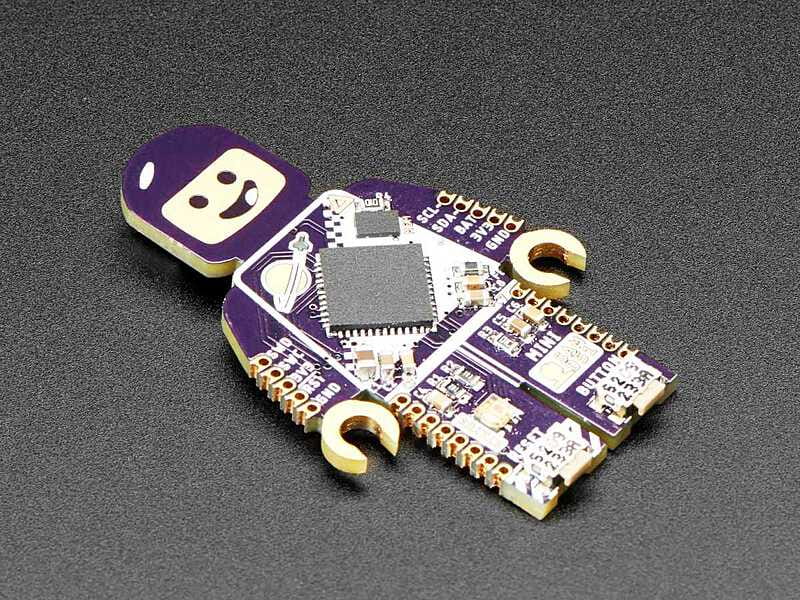Mini SAM M4
by Benjamin Shockley

Mini SAM is a LEGO® minifigure-sized development board based on the Microchip SAMD51G 48-Pin 32-Bit ARM® Cortex®-M4F MCU running at 48Mhz.
Board Features
I/O
The boards includes a micro USB interface for programming and power. Around the edges are 0.050″ spaced breakouts for the six analog pins, including true analog out, and several digital pins available on the SAMD51G including some dedicated I2C, SPI, and UART connections.
The Mini SAM boards include two LED indicators; a standard “Built-In” LED and an APA102 RGB LED. The standard LED is red and located on the reverse side of the board. When illuminated it lights up the spaceship on on the logo. There are two built-in buttons as well; a RESET button and a user programmable BUTTON.
Memory
In order to support CircuitPython, a 2MB Quad-SPI flash memory chip is included. This provides plenty of space for the CircuitPython program as well as space for user programming. It comes pre-loaded with the latest CircuitPython library bundle.
Power
The boards include a 600mA 3.3V regulator, more than enough to power this little board and its built-in features. The board can be powered from a micro-USB or via a battery connected to the BAT pin – it will automatically switch between the two. There are exposed pads to solder on an optional 2-JST battery connector on the back or directly to the BAT pin.
Purchase
When in stock, you can purchase a board from minifigboards.com
Contribute
Have some info to add for this board? Edit the source for this page here.
CircuitPython 9.2.1
This is the latest stable release of CircuitPython that will work with the Mini SAM M4.
Use this release if you are new to CircuitPython.
Built-in modules available: _asyncio, _bleio, _pixelmap, adafruit_bus_device, adafruit_pixelbuf, aesio, alarm, analogio, array, atexit, audiocore, audioio, audiomixer, audiomp3, binascii, bitbangio, bitmaptools, board, builtins, builtins.pow3, busdisplay, busio, busio.SPI, busio.UART, codeop, collections, countio, digitalio, displayio, epaperdisplay, errno, fontio, fourwire, framebufferio, frequencyio, getpass, gifio, i2cdisplaybus, i2ctarget, io, json, keypad, keypad.KeyMatrix, keypad.Keys, keypad.ShiftRegisterKeys, locale, math, microcontroller, msgpack, neopixel_write, nvm, onewireio, os, os.getenv, paralleldisplaybus, ps2io, pulseio, pwmio, rainbowio, random, re, rgbmatrix, rotaryio, rtc, samd, sdcardio, select, sharpdisplay, storage, struct, supervisor, sys, terminalio, time, touchio, traceback, ulab, usb_cdc, usb_hid, usb_midi, vectorio, warnings, watchdog, zlib
Included frozen(?) modules: adafruit_dotstar
Features: Castellated Pads
Absolute Newest
Every time we commit new code to CircuitPython we automatically build binaries for each board and language. The binaries are stored on Amazon S3, organized by board, and then by language. These releases are even newer than the development release listed above. Try them if you want the absolute latest and are feeling daring or want to see if a problem has been fixed.
Previous Versions of CircuitPython
All previous releases of CircuitPython are available for download from Amazon S3 through the button below. For very old releases, look in the OLD/ folder for each board. Release notes for each release are available at GitHub button below.
Older releases are useful for testing if you something appears to be broken in a newer release but used to work, or if you have older code that depends on features only available in an older release. Otherwise we recommend using the latest stable release.
Update UF2 Bootloader
Latest version: v3.15.0
The bootloader allows you to load CircuitPython, MakeCode, and Arduino programs. The bootloader is not CircuitPython. You can check the current version of your bootloader by looking in the INFO_UF2.TXT file when the BOOT drive is visible (FEATHERBOOT, CPLAYBOOT, etc.).
It is not necessary to update your bootloader if it is working fine. Read the release notes on GitHub to see what has been changed. In general, we recommend you not update the bootloader unless you know there is a problem with it or a support person has asked you to try updating it.
To update, first save the contents of CIRCUITPY, just in case. Then double-click the reset button to show the BOOT drive. Drag the update-bootloader .uf2 file to the BOOT drive. Wait a few tens of seconds for the bootloader to update; the BOOT drive will reappear. After you update, check INFO_UF2.TXT to verify that the bootloader version has been updated. Then you will need to reload CircuitPython.
